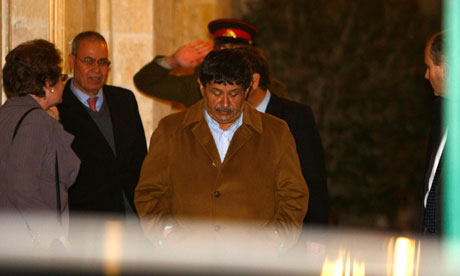Libyan minister to take Turkish peace plan to Gaddafi
Rebels also 'positive' about three-point plan after separate meeting with Turkish officials

Libya's new foreign minister Abdel Ati al-Obeidi will present the proposal to Muammar Gaddafi, said Turkish government sources. Photograph: Darrin Zammit Lupi/Reuters
Turkey has proposed a path to a peaceful resolution to the deadlocked conflict in Libya, involving a withdrawal by Muammar Gaddafi's forces from cities held by the rebels, and democratic reform.
Recep Tayyip Erdogan, the Turkish prime minister, has outlined the proposal in Ankara, saying: "We are working on the details of this roadmap." It would include humanitarian corridors in Libya, he said.
Turkey, which this week hosted an envoy from the Gaddafi regime, the new foreign minister, Abdel Ati al-Obeidi, said the measures would be discussed at an international meeting on Libya in Qatar next week. The US, European countries and Middle Eastern allies will take part.
Obeidi was reported to be floating ideas for a three-country tour in search of a political solution, with Gaddafi staying in power while constitutional reforms were introduced. Libya's opposition and the international coalition reject any plan involving Gaddafi remaining in power.
Erdogan outlined three elements to his proposal: a ceasefire in the cities surrounded by Gaddafi's forces, including Misrata; a humanitarian corridor to allow aid to enter, co-ordinated with Tripoli; and negotiations leading to a new political process in Libya, including free elections.
Sources close to Erdogan said he had discussed the proposal with Obeidi, who would take the message back to Tripoli.
The Turkish government also met Mustafa Abdul Jalil, the chairman of the rebel council, in Doha recently. Jalil was said to have been "positive" about the proposal.
Meanwhile, Nato is investigating a claim by Libyan rebels that a botched air strike has killed at least 13 of its fighters as the west scrambled to deal with what commanders admit is a flaw in communications with rebels on the battlefield.
The revolutionary leadership sought to defuse anger at Nato over the strike near the frontline town of Brega, where several missiles hit rebel tanks, by claiming that it was carried out by Gaddafi's air force. That appeared unlikely given the imposition of the no-fly zone and the destruction of his air defences in recent days.
The Nato aircraft appear not to have been informed that, for the first time, rebels had moved several tanks, rocket launchers and other armour up to the frontline . All of it was seized from government forces and therefore was indistinguishable from Gaddafi's weaponry.
But the second Nato attack on rebel forces in less than a week deepened anger and suspicion about the actions of the alliance, which is accused in rebel-held areas of abandoning the fight against Gaddafi. Nato had been keen to assuage those concerns by demonstrating that it is still taking on the Libyan leader's army.
A rebel commander, Ayman Abdul-Karim, told the Associated Press that he had seen air strikes hit tanks and a rebel convoy, including a bus carrying fighters toward Brega. He and other rebels described dozens killed or wounded.
Rebel fighters who saw the strike were furious. "Nato are liars. They are siding with Gaddafi," said Salem Mislat.
Thirteen people, including three doctors, died last Friday in a western air raid after rebels opened fire with an anti-aircraft gun while a Nato plane was overhead.
Yesterday's incident came as western powers tried to improve slow communications between the rebels and Nato commanders, who are receiving old information about the situation on the ground.
A fresh assault by Gaddafi's forces appeared to be pushing the revolutionaries back once again. The government army advanced close enough to Ajdabiya, the last main town before the revolutionaries' de facto capital, Benghazi, to shell its western gate. That sent people fleeing in their thousands from Ajdabiya, which has changed hands several times.
The revolutionaries' military problems are being compounded by a looming economic crisis. Western governments that have established diplomatic ties with the revolutionary council are now urgently trying to find ways to legally get frozen Libyan assets to the rebel administration, which says it has less than a fortnight's cash available.
The matter is complicated by UN sanctions against Libyan state bodies, which appear to prevent western governments from transferring funds in to banks even in rebel-held territory. The US holds about £20bn in Libyan assets and Britain has several billion, but officials say releasing the funds is proving legally complicated.
The economic crisis is likely to be compounded by plunging oil production that was cut further on Wednesday by an attack on a pumping station. Nato dismissed the regime's claims that British planes were responsible for the attack, saying it was carried out by Gaddafi's forces.
The American general who heads the US's Africa command, Carter Ham, told Congress that he believes the conflict is settling into a stalemate. He advised against providing weapons to the rebels until the US is confident about who exactly they are, amid warnings from other members of the American military about ties to Islamist extremists.
However, that concern is rapidly receding among western diplomats dispatched to Benghazi to deal with the rebels who say that they have been impressed by a commitment to creating a free and democratic society.
Libyan spokesman Musa Ibrahim said he was not aware of the details of the plan, but added: "We are open to all proposals for reform from within Libya."
No comments:
Post a Comment